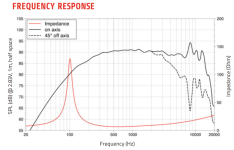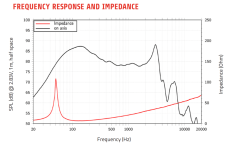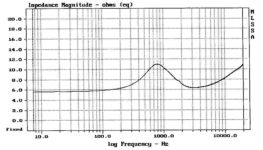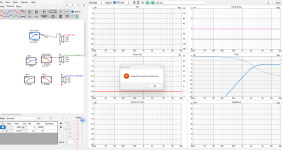The one on the upper left side. The origin of the coordinates is the TW axis.What icon generates the source for this software?
Below you see an example of an active 3-way: if you click on the "LIB" button and check "active" you will find more examples.
The sb26cdc/adc are generally appreciated.
Yea ribbons really need to be used right or they cause problems. Nearly all of them should be crossed above 3khz. I like that they don’t interact with the floor or ceiling, but the height of the ribbon/amt/planar is 100% of your listening angles. They do play very wide on average, but it’s strange directivity to work with. It also demands a very good midrange. I think the appropriate application is usually when a design starts with a quality small wideband that has broad dispersion up to the many thousands of kilohertz. This is how the Philharmonic BMR came to use the RAAL OEM extra tall ribbon, practically on top of the BMR mid. Then it comes down to finding a bass driver that crosses high enough and goes low enough at the correct sensitivity. The BMR could hardly be done as a two-way, if it’s treble is to be believed, but a 1” dome would likewise be overkill crossing at ~4khz. Ironically the mid is only $40 in this $1000 speaker.
Otherwise, though I love non domes, I have heard really good domes for low prices now. And for high prices.
Otherwise, though I love non domes, I have heard really good domes for low prices now. And for high prices.
Raal and Aurum Cantus
I’ve had a number of Aurum Cantus. I quite liked them. But the ribbon that still holds the top in my experience was the horn loaded Decca London, which dealt with the lower frequency distortion issuses and allowed them to be crossed at 1-1.5kHz.
I am not a huge fan of domes, i prefer somnething that can cross REALLY low.
dave
Last edited:
Morel 308 tweeter
Lavocce 4 mid
Lavoce 8 woofer
Lavocce 4 mid
Lavoce 8 woofer
Attachments
-
 lavoce 4.png206.8 KB · Views: 37
lavoce 4.png206.8 KB · Views: 37 -
lavoce 4_SPL.txt18.3 KB · Views: 45
-
lavoce 4_ZR.txt18.3 KB · Views: 43
-
 lavoce 8.png104.8 KB · Views: 39
lavoce 8.png104.8 KB · Views: 39 -
lavoce 8_SPL.txt18.3 KB · Views: 44
-
Morel 308 spl_SPL.txt18.3 KB · Views: 44
-
 Morel 308 spl.png138.8 KB · Views: 42
Morel 308 spl.png138.8 KB · Views: 42 -
lavoce 8_ZR.txt18.3 KB · Views: 43
-
 Morel 308 zr.png279.5 KB · Views: 40
Morel 308 zr.png279.5 KB · Views: 40 -
Morel 308 zr_ZR.txt18.3 KB · Views: 45
Am i correct that either the mid and/or woofer need be replaced to have a better range given the dip at 300?
Joppepelen on youtube. Skrilex or something similar here on exotic forum shows you how to build your own various tweeters.
Dump your center speaker and build 3-9 identical speakers. "Center speakers" are only for if you dont have room for a proper speaker.
Cheers!
Dump your center speaker and build 3-9 identical speakers. "Center speakers" are only for if you dont have room for a proper speaker.
Cheers!
i don't have room for a proper center. also, it is behind my acoustic transparent screen, and only 5 inches deep. and i don't want to toss my center.
First you will need to design a baffle shape and an enclosure volume for each driver (besides the tweeter, if it isn‘t open back). This can be done in Tools -> Enclosure in the menu. You will need to ensure the correct T/S parameters for each driver are accounted for. Then you will have to merge the enclosure responses with the frequency responses. Then you need to simulate a baffle, like how I explained here.
https://www.audiosciencereview.com/...th-coax-and-woofers.49055/page-2#post-1762431
https://www.audiosciencereview.com/...th-coax-and-woofers.49055/page-2#post-1762431
The woofer may be fine in the correct enclosure on the correct baffle. This is the work you will need to do.
- Home
- Loudspeakers
- Multi-Way
- Critique my planned 3 way...
